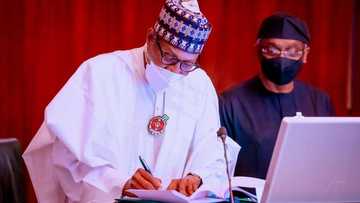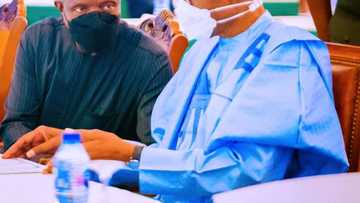From Obasanjo to Buhari: List of Loans Borrowed under Nigeria's 4 Presidents
Recently, President Muhammadu Buhari stirred heated reactions from Nigerians when he tabled a fresh request for the approval of another set of loans before the Senate.
PAY ATTENTION: Click “See First” under the “Following” tab to see Legit.ng News on your Facebook News Feed!
The Nigerian leader sought approval from the National Assembly to borrow $4,054,476,863.00, €710 million and a grant of $125 million.
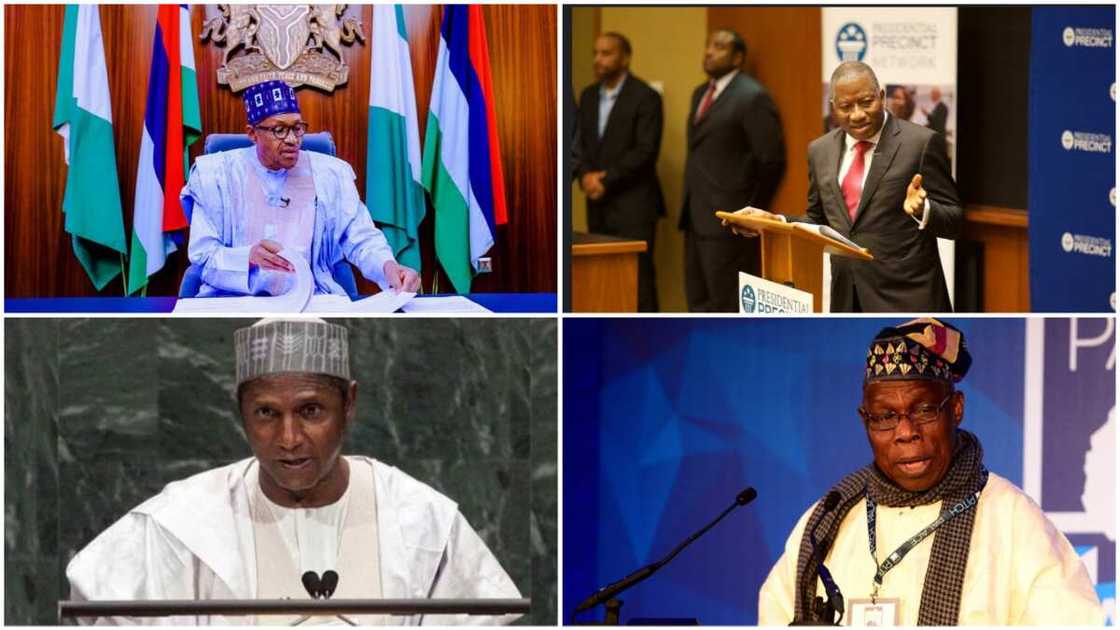
Source: Facebook
Many Nigerians are against the borrowing spree of the current administration as it seeks to provide more infrastructure amid dwindling revenue.
Nigeria’s public debt has been on the rise. As of March 2021, Nigeria’s total public debt has hit N33.1 trillion ($87.24 billion); an accumulation of borrowings from successive governments.
The Cable recently reported that despite securing debt relief during the Olusegun Obasanjo-led administration, successive governments have continued on a borrowing spree.
PAY ATTENTION: Join Legit.ng Telegram channel! Never miss important updates!
The newspaper stated that the federal government’s component of the public debt surged 658% to N26.9 trillion in the last 21 years.
Citing data from the Debt Management Office (DMO), the report stated that federal government borrowings (local and foreign debt) climbed from N3.55 trillion in 1999 to N26.91 trillion at the end of March 2021 (the country’s latest official figure).
Since 1999 when Nigeria returned to democracy, Nigeria has had four presidents, Olusegun Obasanjo, Umaru Yar'Adua, Goodluck Jonathan and Muhammadu Buhari.
This report looks at the loans taken under the four administrations.
1. Ex-President Obasanjo
External debt: Reduction from $28.04 billion in 1999 to $2.11 billion in 2007.
Domestic debt: Increase from N798 billion to N2.17 trillion
FG's debt: Reduction from N3.55 trillion in 1999 to N2.42 trillion in 2007
FG’s local and foreign debt level: 31.8% reduction
Exchange rate: N98.02/N116.8 to $1
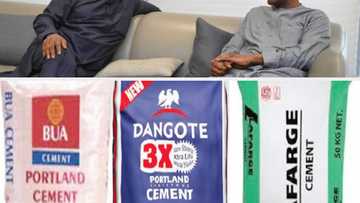
Read also
Dangote, other cement producers make over N156.55bn Profit from cement sales despite high production cost
Note: Huge decline in foreign debt was a result of the substantial reduction following the pay-off of the outstanding debts owed to the London Clubs of Creditors in the first quarter of 2007.
Yar'Adua/Jonathan (2007 to 2011)
Foreign debt - Increase from $2.11 billion in 2007 to $3.5 billion in 2011
Domestic debt: Increase from N2.17 trillion in 2007 to N5.62 trillion in 2011
Exchange rate: Increase from N116.8/$1 to N156.7/$1.
Percentage increase: 155%
Note: Of the debt figure, Jonathan completed the tenure from May 2010 to May 2011 after the death of Yar’Adua. During the period, the debt reportedly rose from N4.94 trillion to N6.17 trillion (24.9% increase in one year).
Ex-President Jonathan
Start of the administration (2011):
External debt: $3.5 billion
Domestic debt: N5.62 trillion
Accumulated debt of N6.17 trillion.
2014
Foreign debt - $6.45 billion
Domestic debt - N7.9 trillion (Exchange rate also stood at N197/$1)
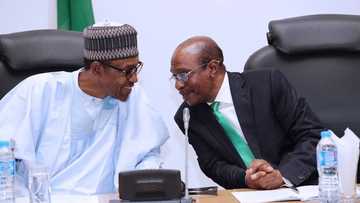
Read also
Nigeria's Excess Crude Account depletes to $35m, as CBN withdraws $384m in 2wks from external reserve
Total public debt (2011 to 2015): Increased from N6.17 trillion in 2011 to N9.8 trillion in 2015 (Increase of N3.63 trillion)
Percentage increase: 58.8%
President Buhari
2015:
External debt: $7.35 billion
Domestic debt: N8.84 trillion
FX rate: 197
2020
External debt: $28.57 billion
Domestic debt: N16.02 trillion
Domestic debt: Increase by N7.63 trillion (June 2015 to December 2020)
External borrowings: Increase by $21.27 billion (as of December 2020)
FX: N381 (2020)
Percentage increase: 173.2% from 2015
According to the report by The Cable, President Buhari is the country’s biggest borrower, increasing public debt (FG component) by more than 173%.
The Yar’Adua/Jonathan administration took the second spot with a 155% surge in borrowing.
The third spot is occupied by the Jonathan government which recorded a 58.8% increase.
In the last four administrations, only the Obasanjo administration reduced public debt.
What I told Buhari about borrowings - Lawan
In other news, Ahmad Lawan, president of the Senate, has advised President Buhari to reduce the external borrowings being incurred to fund the country’s annual budgets.
The principal lawmaker advised the president to, instead, focus on blocking financial leakages and avoiding wastage in all tiers of government.
Legit.ng gathers that Lawan said this on Monday, August 23, in Abuja, after a closed-door meeting with President Buhari at the State House.
Source: Legit.ng


